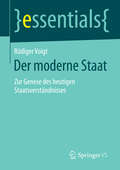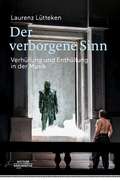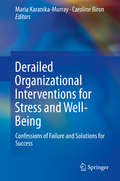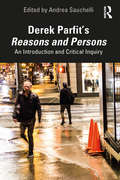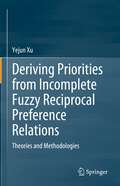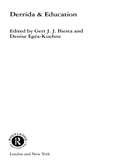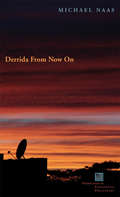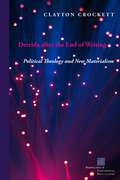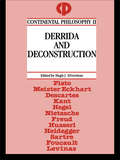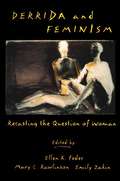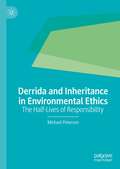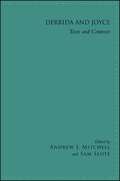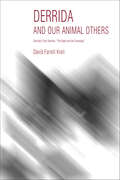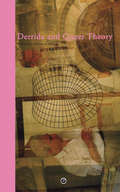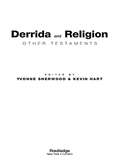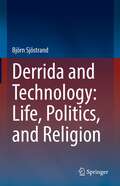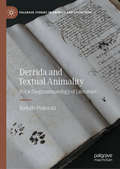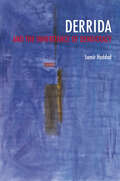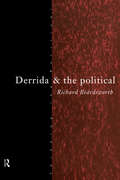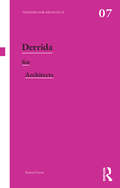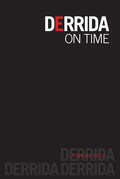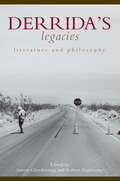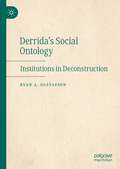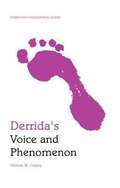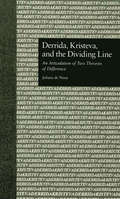- Table View
- List View
Der moderne Staat: Zur Genese des heutigen Staatsverständnisses (essentials)
by Rüdiger VoigtRüdiger Voigt gibt in diesem Essential einen Überblick über die Geschichte europäischen Staatsdenkens anhand ausgewählter Staatsdenker. Er leitet zentrale Begriffe der Staatsdiskussion wie Macht, Herrschaft, Souveränität, Gesellschaftsvertrag, Freiheit, Sicherheit und Bürokratie her und bettet die traditionelle Staatsdiskussion in gravierende Probleme unserer Zeit wie beispielsweise Terrorismus sowie Überwachung.
Der verborgene Sinn: Verhüllung und Enthüllung in der Musik
by Laurenz LüttekenEin Sinn, der verborgen oder enthüllt werden kann, ist eine der zentralen Denkfiguren der Neuzeit. Das betrifft auch die Frage, was Musik eigentlich sei. Je stärker man darüber nachgedacht hat, desto brüchiger, changierender ist die Annahme von einem substantiellen Wesenskern der Musik geworden. In diesem Buch geht es nicht um ästhetische oder theoretische Überlegungen dazu, sondern um die Frage, ob und auf welche Weise komponierte Musik sich selbst zum Gegenstand macht und so möglicherweise etwas von ihrem Kern preisgibt. Die optischen Metaphern von Verhüllung und Enthüllung erweisen sich dabei als ebenso hilfreich wie anschaulich. In einer Reihe von Beispielen, die vom 17. bis in die Gegenwart reichen, wird das Phänomen in seiner ganzen Vielfalt beschrieben. Dabei geht es nicht nur um Opern von Mozart bis Strauss, sondern auch um Monteverdis Vokalmusik, Haydns „Schöpfung“, die Sinfonien Bruckners oder Ligetis Etüden.
Derailed Organizational Interventions for Stress and Well-Being
by Maria Karanika-Murray Caroline BironProviding an overview of researchers' and practitioners' "confessions" on the fascinating phenomenon of failed or derailed organizational health and well-being interventions and contextualizing these confessions is the aim of this innovative volume. Organizational intervention failures, paradoxes and unexpected consequences can offer a lot of rich and extremely useful practical lessons on intervention design and implementation and possibly on the design of future research on organizational interventions. This volume presents lessons learned from derailed interventions and provides possible solutions to those tasked with implementing interventions. It provides an open, practical and solutions-focused account of researchers' and practitioners' experiences in implementing organizational interventions for health and well-being.
Derek Parfit’s Reasons and Persons: An Introduction and Critical Inquiry
by Andrea SauchelliDerek Parfit (1942–2017) is widely considered to be one of the most important moral philosophers of the twentieth century. Reasons and Persons is arguably the most influential of the two books published in his lifetime and hailed as a classic work of ethics and personal identity. Derek Parfit’s Reasons and Persons: An Introduction and Critical Inquiry is an outstanding introduction to and assessment of Parfit’s book, with chapters by leading scholars of ethics, metaphysics and of Parfit’s work. Part I provides a much-needed introduction to key topics and themes in Reasons and Persons that will be useful for those new to Parfit’s complex work. These include Parfit’s idea of self-defeating theories, rationality and time, personal identity, future generations and well-being. Part II explores various debates generated by Reasons and Persons, including its connections with Buddhism, metaethics, theory of rationality, transformative choices and further developments in personal identity and metaphysics such as conativism. Combining clear exposition of the major topics and arguments in Reasons and Persons with scholarly perspectives on more advanced themes, this book is ideal for students of ethics, metaethics, metaphysics and anyone interested in Derek Parfit’s philosophy.
Deriving Priorities from Incomplete Fuzzy Reciprocal Preference Relations: Theories and Methodologies
by Yejun XuAs we know, multiplicative preference relations (or called pairwise comparisons in AHP) were proposed by Dr. Thomas L Saaty. One important work is to derive its priority from pairwise comparisons. It has been proposed many methods to derive priority for multiplicative preference relation. On the basis of fuzzy sets, the fuzzy reciprocal preference relation is proposed and is extended to the incomplete contexts. However, how to derive the priorities from incomplete fuzzy reciprocal preference relations is an interesting and challenging work. This book systematically presents the theories and methodologies for deriving priorities from incomplete fuzzy reciprocal preference relations. This book can be divided into three parts. In the first part, this book introduces the basic concepts of fuzzy reciprocal preference relations and incomplete fuzzy reciprocal preference relations. Then, two consistencies of complete fuzzy reciprocal preference relations are introduced: additive consistency and multiplicative consistency. Then, the relationships between the fuzzy reciprocal elements and the weights are showed. Afterward, in the second part, different priority methods are presented. The inconsistency repairing procedures are also proposed. Last, the priority method for incomplete hesitant fuzzy reciprocal preference relations is presented. This book can be used as a reference for researchers in the areas of management science, information science, systems engineering, operations research, and other relevant fields. It can also be employed as a textbook for upper-level undergraduate students and graduate students.
Derrida & Education (Routledge International Studies in the Philosophy of Education #Vol. 10)
by Gert J. J. Biesta Denise Egéa-KuehneBringing together the work of international experts in the field, and two interviews with Derrida himself, this book provides a key to the reflections that Derrida's work has prompted on all aspects of educational studies. The contributors address fundamental educational issues from a Derridian perspective to demonstrate the relevance of his work in contemporary, multicultural societies.
Derrida From Now On (Perspectives in Continental Philosophy)
by Michael NaasWritten in the wake of Jacques Derrida's death in 2004, Derrida From Now On attempts both to do justice to the memory of Derrida and to demonstrate the continuing significance of his work for contemporary philosophy and literary theory. If Derrida's thought is to remain relevant for us today, it must be at once understood in its original context and uprooted and transplanted elsewhere. Michael Naas thus begins with an analysis of Derrida's attachment to the French language, to Europe, and to European secular thought, before turning to Derrida's long engagement with the American context and to the ways in which deconstruction allows us to rethink the history, identity, and promise of post-9/11 America. Taking as its point of departure several of Derrida's later works (from "Faith and Knowledge" and The Work of Mourning to Rogues and Learning to Live Finally), the book demonstrates how Derrida's analyses of the phantasms of sovereignty, the essential autoimmunity of democracy or religion, or the impossible mourning of the nation-state can help us to understand what is happening today in American culture, literature, and politics. Though Derrida's thought has always lived on only by being translated elsewhere, his disappearance will have driven home this necessity with a new force and an unprecedented urgency. Derrida From Now On is an effect of this force and an attempt to respond to this urgency.
Derrida after the End of Writing: Political Theology and New Materialism (Perspectives in Continental Philosophy)
by Clayton CrockettWhat are we to make of Jacques Derrida’s famous claim that “every other is every other,” if the other could also be an object, a stone or an elementary particle? Derrida’s philosophy is relevant not just for human ethical language and animality, but to profound developments in the physical and natural sciences, as well as ecology. Derrida After the End of Writing argues for the importance of reading Derrida’s later work from a new materialist perspective. In conversation with Heidegger, Lacan, and Deleuze, and critically engaging newer philosophies of speculative realism and object-oriented ontology, Crockett claims that Derrida was never a linguistic idealist. Furthermore, something changes in his later philosophy something that cannot be simply described as a “turn.” In Catherine Malabou’s terms, there is a shift from a motor scheme of writing to a motor scheme of plasticity. Crockett explores some of the implications of interpreting Derrida through the new materialist lens of technicity or plasticity, attending to the significance of ethics, religion, and politics in his later work. By reading Derrida from a new materialist perspective, Crockett provides fresh readings of his ideas of sovereignty, religion, responsibility, and mourning. These new readings produce fruitful engagements with the thinkers who have followed Derrida, including Malabou, Timothy Morton, John D. Caputo, and Karen Barad. Here is a new reading of Derrida that moves beyond conventional understandings of poststructuralism and deconstruction, a reading that is responsive to and critical of some of the crucial developments shaping the humanities today.
Derrida and Deconstruction (Continental Philosophy #Vol. Ii)
by Hugh J. SilvermanThe effects of Derrida's writings have been widespread in literary circles, where they have transformed current work in literary theory. By contrast Derrida's philosophical writings--which deal with the whole range of western thought from Plato to Foucault--have not received adequate attention by philosophers. Organized around Derrida's readings of major figures in the history of philosophy, Derrida and Deconstruction focuses on and assesses his specifically philosophical contribution. Contemporary continental philosophers assess Derrida's account of philosophical tradition, with each contributor providing a critical study of Derrida's position on a philosopher she or he has already studied in depth These figures include Plato, Meister Eckhart, Descartes, Kant, Hegel, Nietzsche, Freud, Husserl, Heidegger, Sartre, and Foucault.
Derrida and Feminism: Recasting the Question of Woman
by Ellen K. Feder Mary C. Rawlinson Emily ZakinThe first-ever compilation of articles that highlights the intersection of Derridean and feminist theories--a work that represents the extensive and diverse response feminist theorists have had to Derrida, particularly to the issues of gender, identity, and the construction of the subject.
Derrida and Inheritance in Environmental Ethics: The Half-Lives of Responsibility
by Michael PetersonThis book argues for the necessity of a re-evaluation of our thinking about responsibly relating to future generations in the context of environmental philosophy. Using long-term nuclear waste disposal as its paradigmatic case, this book makes the case that the predominant mode of thinking the future in terms of continuity and repetition of the present requires a critique informed by French philosopher Jacques Derrida in order to think responsibility adequately. The book begins by surveying contemporary accounts of intergenerational responsibility before outlining the specifics of nuclear waste disposal policy. With these stakes established, the contributions of Jacques Derrida to future-oriented ethics are introduced. These include discussions of communication across contexts, the relationship between inheritance and responsibility, and the political imperatives that result from this critique. This book concludes by arguing for an intergenerational environmental policy that rejects policy and infrastructural projects that depend on the present reproducing itself indefinitely.
Derrida and Joyce: Texts and Contexts (SUNY series in Contemporary French Thought)
by Andrew J. Mitchell Sam SloteBringing together all of Jacques Derrida's writings on James Joyce, this volume includes the first complete translation of his book Ulysses Gramophone: Two Words for Joyce as well as the first translation of the essay "The Night Watch." In Ulysses Gramophone, Derrida provides some of his most thorough reflections on affirmation and the "yes," the signature, and the role of technological mediation in all of these areas. In "The Night Watch," Derrida pursues his ruminations on writing in an explicitly feminist direction, offering profound observations on the connection between writing and matricide. Accompanying these texts are nine essays by leading scholars from across the humanities addressing Derrida's treatments of Joyce throughout his work, and two remembrances of lectures devoted to Joyce that Derrida gave in 1982 and 1984. The volume concludes with photographs of Derrida from these two events.
Derrida and Our Animal Others: Derrida's Final Seminar, "The Beast and the Sovereign" (Studies in Continental Thought)
by David Farrell KrellJacques Derrida's final seminars were devoted to animal life and political sovereignty—the connection being that animals slavishly adhere to the law while kings and gods tower above it and that this relationship reveals much about humanity in the West. David Farrell Krell offers a detailed account of these seminars, placing them in the context of Derrida's late work and his critique of Heidegger. Krell focuses his discussion on questions such as death, language, and animality. He concludes that Heidegger and Derrida share a commitment to finding new ways of speaking and thinking about human and animal life.
Derrida and Queer Theory (PDF)
by Christian HiteComing from behind (derrière)—how else to describe a volume called “Derrida and Queer Theory”? — as if arriving late to the party, or, indeed, after the party is already over. After all, we already have Deleuze and Queer Theory and, of course, Saint Foucault. And judging by Annamarie Jagose’s Queer Theory: An Introduction, in which there is not a single mention of “Derrida” (or “deconstruction”) — even in the sub-chapter titled “The Post-Structuralist Context of Queer” — one would think that Derrida was not only late to the party, but was never there at all. This untimely volume, then, with wide-ranging essays from key thinkers in the field, addresses, among other things, what could be called the disavowed debt to “Derrida” in canonical “queer theory.”
Derrida and Religion: Other Testaments
by Yvonne Sherwood Kevin HartDerrida and Religion: Other Testaments represents the most comprehensive attempt to date to explore, adapt, and test Derrida's contributions and influence on the study of theology, biblical studies, and the philosophy of religion. With over twenty original essays from highly-respected scholars such as John Caputo, Daniel Boyarin, Edith Wyschogrod, Tim Beal, and Gil Anidjar, Derrida and Religion will quickly become the locus classicus for those interested in the increasingly vibrant work on religion and deconstruction and postmodernism.
Derrida and Technology: Life, Politics, and Religion
by Björn SjöstrandThis book is the first monograph that takes a comprehensive approach to Jacques Derrida as a philosopher of technology. It refines and complements his mainstream image as a philosopher of language and deconstructionist of classical literary and philosophical texts. This volume outlines the key features of Derrida’s alternative philosophy of technology, a philosophy which Sjöstrand argues, avoids the problems associated with, on the one hand, a Heideggerian orientation, which completely separates thinking and technology and, on the other, an empirically oriented ”post-phenomenology” that can be said to be hegemonic within the field today.Based on a sustained interpretation of Derrida, and a robust, coherent philosophy of technology, a phenomenology of technology is developed that, in a radical way, extends the concept of technology to cover the entire field of phenomenology. This places the technological not in opposition to humanity, but rather always already in close proximity to man and, consequently, to life, ethics, politics, democracy and religion. Strikingly, this important aspect of Derrida’s thinking is only rarely analyzed or discussed by his many exegetes. This text appeals to graduates and researchers working on Derrida, phenomenology, and the philosophy of technology.
Derrida and Textual Animality: For a Zoogrammatology of Literature (Palgrave Studies in Animals and Literature)
by Rodolfo PiskorskiDerrida and Textual Animality: For a Zoogrammatology of Literature analyses what has come to be known, in the Humanities, as ‘the question of the animal’, in relation to literary texts. Rodolfo Piskorski intervenes in the current debate regarding the non-human and its representation in literature, resisting popular materialist methodological approaches in the field by revisiting and revitalising the post-structuralist thought of Derrida and the ‘linguistic turn’. The book focuses on Derrida’s early work in order to frame deconstructive approaches to literature as necessary for a theory and practice of literary criticism that addresses the question of the animal, arguing that texts are like animals, and animals are like texts. While Derrida’s late writings have been embraced by animal studies scholars due to its overt focus on animality, ethics, and the non-human, Piskorski demonstrates the additional value of these early Derridean texts for the field of literary animal studies by proposing detailed zoogrammatological readings of texts by Freud, Clarice Lispector, Ted Hughes, and Darren Aronofsky, while in dialogue with thinkers such as Butler, Kristeva, Genette, Deleuze and Guattari, and Attridge.
Derrida and the Inheritance of Democracy (Studies In Continental Thought Ser.)
by Samir HaddadDerrida and the Inheritance of Democracy provides a theoretically rich and accessible account of Derrida's political philosophy. Demonstrating the key role inheritance plays in Derrida's thinking, Samir Haddad develops a general theory of inheritance and shows how it is essential to democratic action. He transforms Derrida's well-known idea of "democracy to come" into active engagement with democratic traditions. Haddad focuses on issues such as hospitality, justice, normativity, violence, friendship, birth, and the nature of democracy as he reads these deeply political writings.
Derrida and the Political (Thinking the Political)
by Richard BeardsworthJacques Derrida, one of the most influential, controversial and complex thinkers of our time, has come to be at the centre of many political debates. This is the first book to consider the political implications of Derrida's deconstruction. It is a timely response both to Derrida's own recent shift towards thinking about the political, and to the political focus of contemparary Continental philosophy.Richard Beardsworth's study, Derrida and the Political, locates a way of thinking about deconstruction using the tools of political philosophy. Richard Beardsworth has provided students of philosophy, politics and critical theory with a thought-provoking, upper level introduction to Derrida'a work as a political theorist.
Derrida for Architects (Thinkers for Architects)
by Richard CoyneLooking afresh at the implications of Jacques Derrida’s thinking for architecture, this book simplifies his ideas in a clear, concise way. Derrida‘s treatment of key philosophical texts has been labelled as "deconstruction," a term that resonates with architecture. Although his main focus is language, his thinking has been applied by architectural theorists widely. As well as a review of Derrida’s interaction with architecture, this book is also a careful consideration of the implications of his thinking, particularly on the way architecture is practiced.
Derrida on Time
by Joanna HodgeThis is a comprehensive investigation into the theme of time in the work of Jacques Derrida and shows how temporality is one of the hallmarks of his thought. Drawing on a wide array of Derrida's texts, Joanna Hodge: compares and contrasts Derrida's arguments concerning time with those Kant, Husserl, Augustine, Heidegger, Levinas, Freud, and Blanchot argues that Derrida's radical understanding of time as non-linear or irregular is essential to his aim of blurring the distinction between past and present, biography and literature, philosophical and religious meditation, and the nature of the self explores the themes of death, touch and transcendence to argue that if considered under the theme of temporality there is more continuity to Derrida's thought than previously considered.
Derrida's Legacies: Literature and Philosophy
by Robert Eaglestone Simon GlendinningThis volume brings together some of the most well-known and highly respected commentators on the work of Jacques Derrida from Britain and America in a series of essays written to commemorate the life and come to terms with the death of one of the most important intellectual presences of our time. Derrida’s thought reached into nearly every corner of contemporary intellectual culture and the difference he has made is incalculable. He was indeed controversial but the astonishing originality of his work, always marked by the care, precision and respect with which he read the work of others, leaves us with a philosophical, ethical and political legacy that will be both lasting and decisive. The sometimes personal, always insightful essays reflect on the multiple ways in which Derrida’s work has marked intellectual culture in general and the literary and philosophical culture of Britain and America in particular. The outstanding contributors offer an interdisciplinary view, investigating areas such as deconstruction, ethics, time, irony, technology, location and truth. This book provides a rich and faithful context for thinking about the significance of Derrida’s own work as an event that arrived and perhaps still remains to arrive in our time. Contributors: Derek Attridge, Thomas Baldwin, Geoffrey Bennington, Rachel Bowlby, Alex Callinicos, David E. Cooper, Simon Critchley, Robert Eaglestone, Simon Glendinning, Marian Hobson, Christopher Johnson, Peggy Kamuf, Michael Naas, Nicholas Royle
Derrida's Social Ontology: Institutions in Deconstruction
by Ryan A. GustafsonDerrida's Social Ontology: Institutions in Deconstruction presents the first dedicated study of Jacques Derrida’s philosophy of institutions. While previous studies of Derrida’s thought have considered his engagement with individual institutions—from the university to literature, law, and psychoanalysis, among others—Derrida’s Social Ontology offers the first attempt to reconstruct and defend the philosophical theory of institutions that underlies these engagements. In so doing, the book argues that the theme of “the institution” in Derrida's oeuvre offers the best throughline for understanding the substantively normative significance of deconstruction as a philosophical practice, arguing that Derrida is unique among so-called “postmodern” thinkers in providing an account of the relationship between the historically contingent character of institutions and the normative entitlements that such entities make possible. Specifically, the book shows how Derrida accounts for this relationship in a way that leaves room for a notion of “unconditional responsibility” for the social and political world to the extent that the latter is structured by perfectible institutions. In tracing the development of Derrida’s account of this link between the historicity and normativity of institutional life—from his early writings on the historicity of the institution of philosophy, to his later critiques of practices of institutional cruelty like the death penalty—Derrida's Social Ontology not only offers readers a new framework for making sense of the normative commitments that defined this philosopher's writings, but will also establish the terms for putting his works into conversation with contemporary debates in social and political philosophy and critical theory more broadly.
Derrida's Voice and Phenomenon
by Vernon W. CisneyPublished in 1967, 'Voice and Phenomenon' marked a crucial turning point in Derrida's thinking: the culmination of a 15-year-long engagement with the phenomenological tradition. It also introduced the concepts and themes that would become deconstruction. 'Voice and Phenomenon' is a short book, but it can be an overwhelming text, particularly for inexperienced readers of Derrida's work. This is the first guide to clearly explain the structure of his argument, step by step.
Derrida, Kristeva, and the Dividing Line: An Articulation of Two Theories of Difference (Comparative Literature and Cultural Studies #5)
by Juliana De NooyBoth Jacques Derrida and Julia Kristeva have made an enormous impact throughout the humanities with their work on signification, identity and difference, and yet the nature of the relation between their theories seems oddly indeterminate: they have sometimes been regarded as more or less indistinguishable and sometimes as incompatible This book aims at establishing precisely how Kristeva's and Derrida's writings may be articulated, tracing intersections and divergences, parallels and discontinuities between them. But how do you compare two theories of the production of difference? What conception of difference do you use to go about it? Any search for a dividing line between Derrida and Kristeva already engages with their preoccupations. Should the juxtaposition of these practices be conceived as a face-to-face confrontation or rather a gap, a hiatus? Could it be a dialectic? or a diff rance? Should it be thought of in terms of Kristeva's work . . . or Derrida's? Accessible and lively, this book studies the theories on their own terms, in terms of one another, and with regard to the literary text, a privileged object of their attention. It demonstrates that the articulation of the theories shifts under different discursive conditions such that a Derridean reading of the relation is unlikely to coincide with a Kristevan interpretation. It shows why there is no single answer to the question of how the two fit together. And it investigates what is at stake in the strategic uses to which their work is put, whether separately or together.
